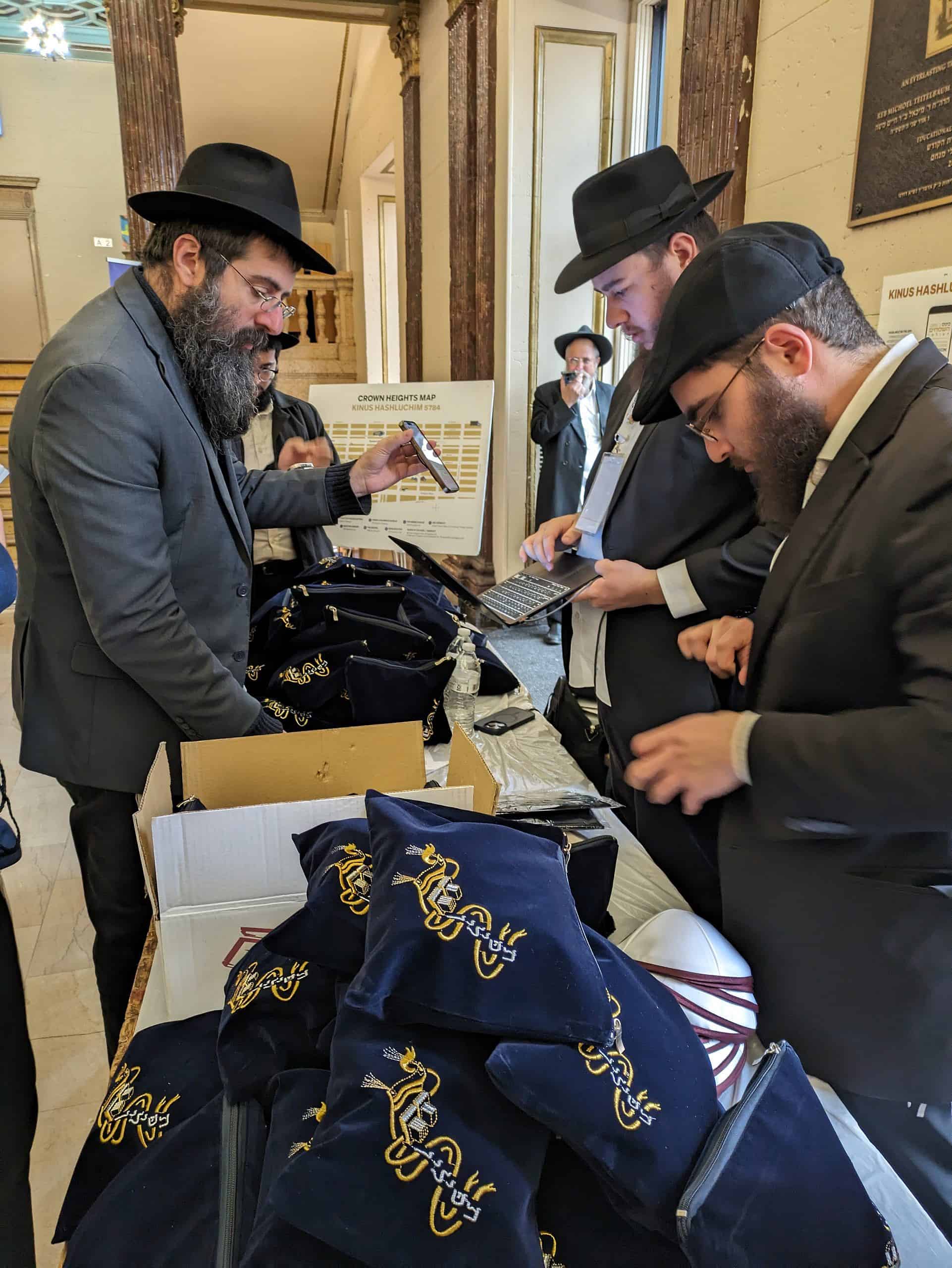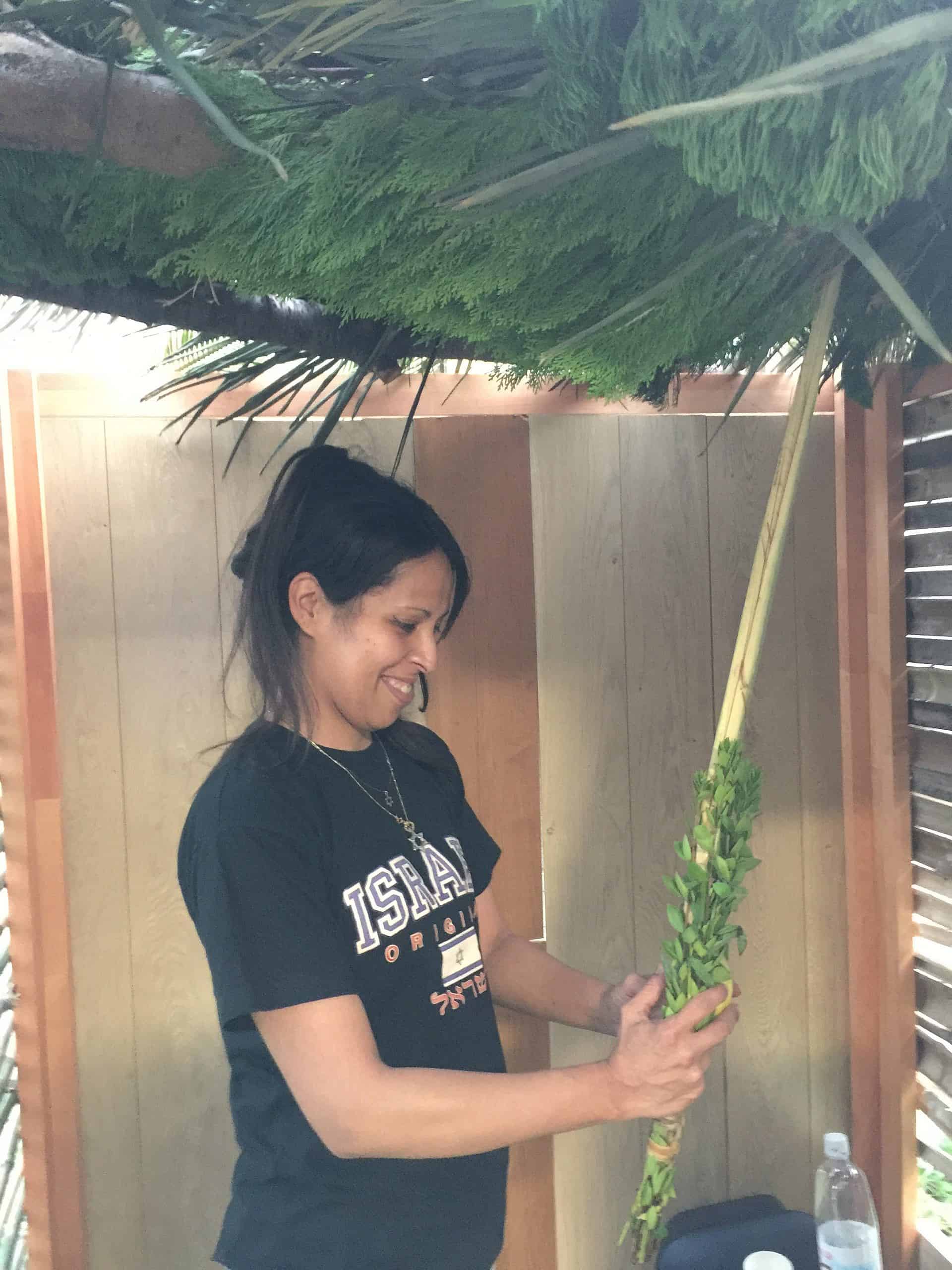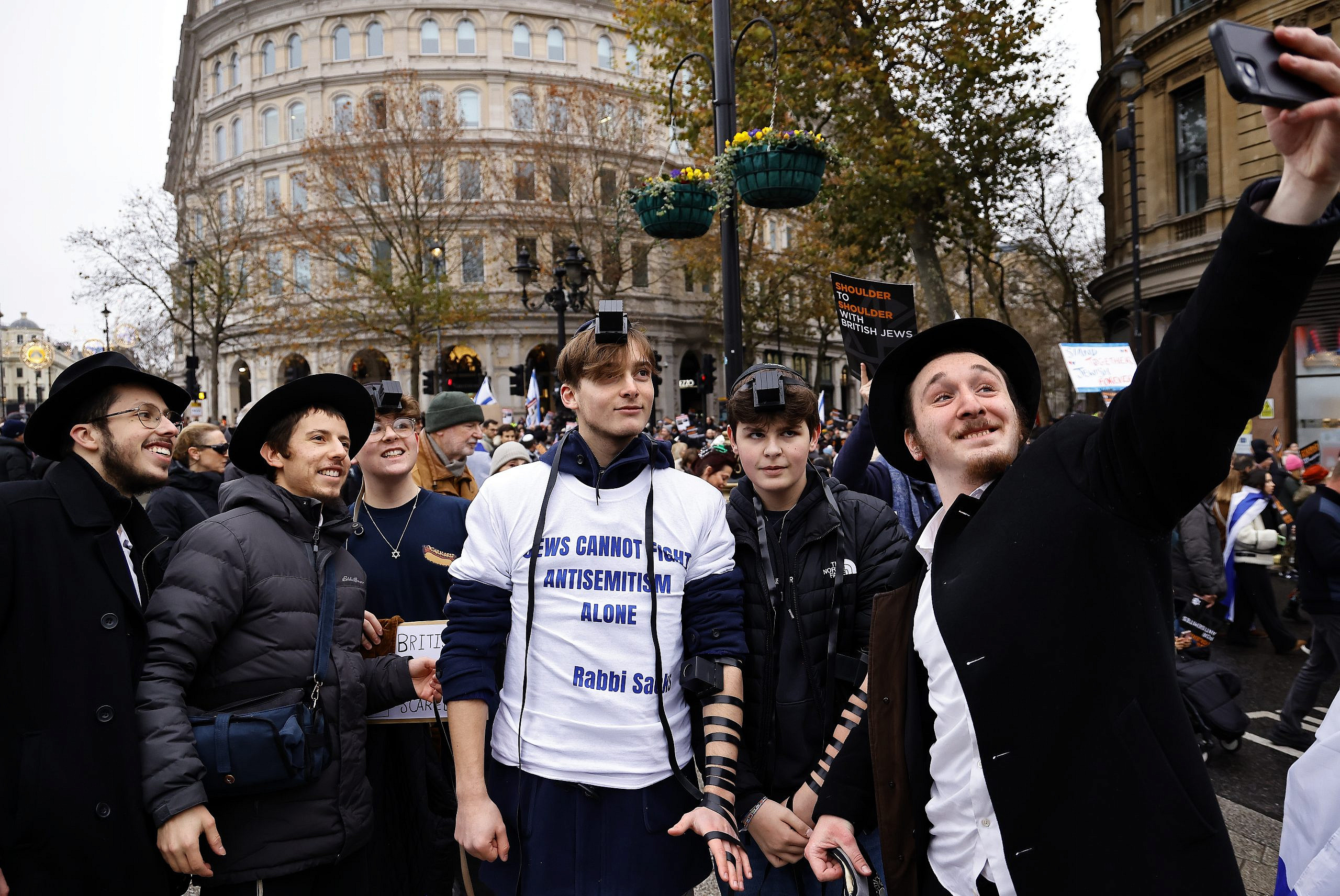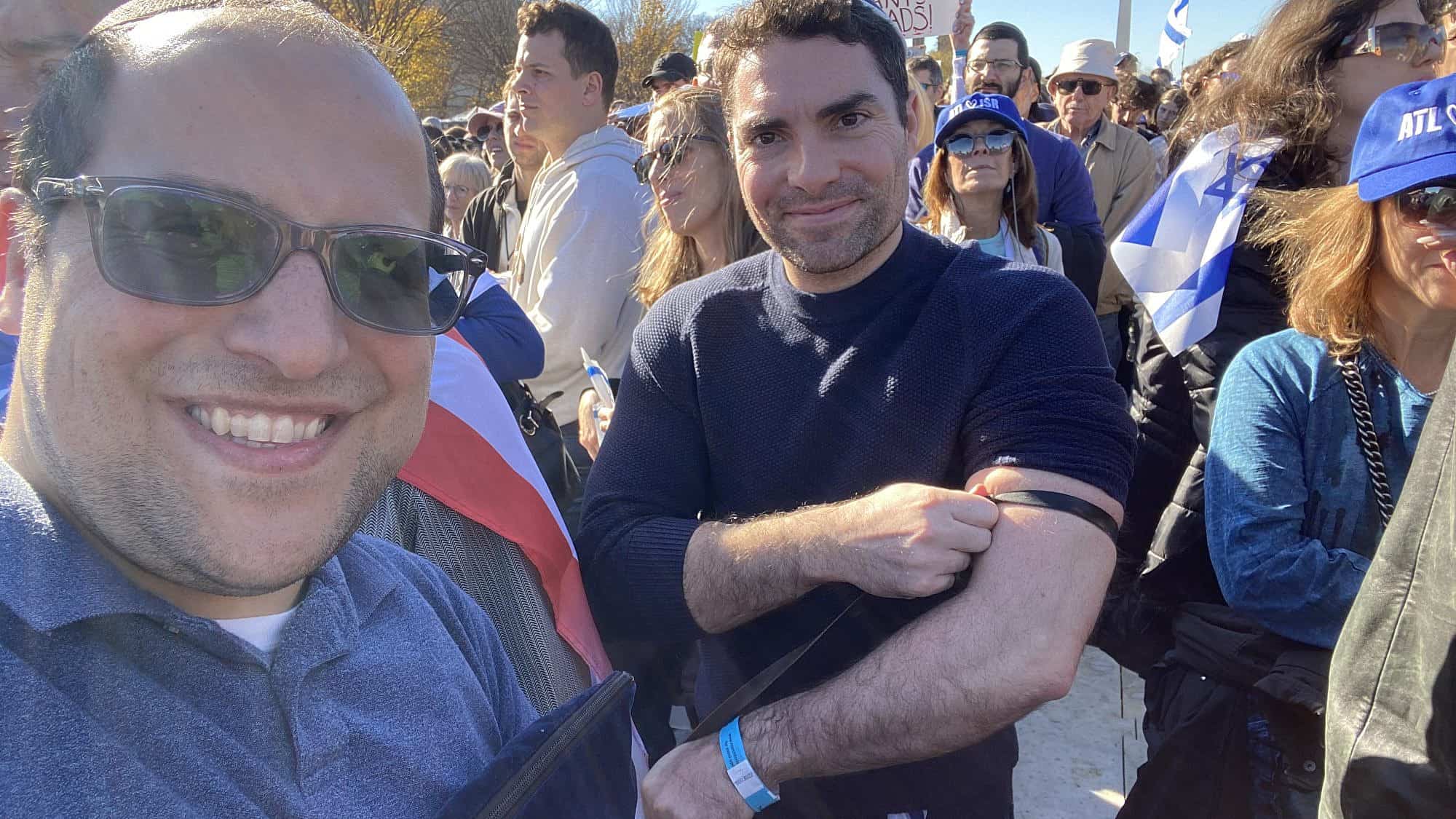Those who experience the trauma of losing a friend or loved one or seeing them injured in a violent conflict often become more religious, according to research that U.S., Canadian, Czech and German researchers published in early 2019 in “War increases religiosity.”
Earlier this month, a Chabad spokesman told JNS that amid a “Jewish awakening of the soul,” there has been a global shortage of tefillin and mezuzahs since Hamas’s Oct. 7 terror attacks on Israel.
Of 211 Chabad rabbis who responded to a poll of its U.S. emissaries three weeks ago, 98% saw their communities increasing religious observance, 86% reported increased attendance at prayers and events, and 93% noticed more communal interest in connecting with fellow Jews. In 86% of Chabad communities, people felt more strongly connected to their Jewish identity.
Further anecdotal examples and observations of clergy suggest that a Jewish religious awakening is underway. Posts on social media indicate that Jews worldwide are taking on more religious practices, including affixing mezuzahs to doorposts; donning yarmulkes or “Star of David” (Magen David) jewelry; donating to charities; lighting candles for Shabbat; making blessings before eating; keeping kosher; and avoiding slandering others. Others have been studying Hebrew; wrapping tefillin; reading Psalms; studying Torah; and praying more regularly or with increased intensity.
Encouraging others to lay tefillin has become a new hobby for New Jersey comedian Eli Lebowicz, who is Orthodox. (He often writes about the hobby on social media, where he recently referred to “one of my tefillin suppliers in Chicago, who has gotten tefillin for 70 people since the war.”)
“I thought: Let’s do as many mitzvot as we can for some sort of merit,” Lebowicz told JNS. He contacted many people he knew and estimates that between 30 and 40 of them have begun regularly putting on tefillin due to his encouragement.
“Everybody was so overcome with what happened and trying to be unified. People said, ‘I haven’t put it on for 15 years’ or ‘since my bar mitzvah,’” he told JNS. “The whole goal is to bring more positivity. In a world that’s so much darker, with so much evil, we have to do more good to outweigh it.”
In Lexington, Ky., the Caribbean and South Africa, tefillin is also getting a good wrap. A man who hasn’t identified with the Jewish community in 45 years knocked on the door of a Chabad House in Kentucky asking to don tefillin, Rabbi Shlomo Litvin, director of Chabad of the Bluegrass, told JNS.

After Rabbi Avromy Super, co-director of Chabad of St. Lucia, posted on social media that he would give a free pair of tefillin to the first person who commits to wrap it daily “in honor of our brothers and sisters in Israel,” he received 3,400 requests for tefillin from those who committed to don them daily, he told JNS. (The post has received some 137,800 views.)
Friends of Eliyahu (“Eli”) David Kay, 25, a South African immigrant to Israel who was murdered in a terror attack in Jerusalem in November 2021, created a “Tefillin against terror” WhatsApp group. That group has seen a “much stronger uptake” since Oct. 7, Rabbi Ari Shishler, director of Chabad of Strathavon, in Sandton, South Africa, told JNS. There are also student-led efforts to encourage classmates at King David Schools in Johannesburg to don tefillin, he said.
Chaim Waxman, professor emeritus of sociology and Jewish studies at Rutgers, the State University of New Jersey, told JNS that it’s not uncommon for people to take on more religious practice amid periods of crisis or major traumatic events.
Those changes “typically are more common among those who were more religiously observant to begin with,” Waxman said. “Some, such as adding special prayers, usually last until the crisis subsides, whereas others can become part of the individual’s typical religious routine.”
Conspicuously Jewish
Jacob Linker, of Washington, D.C., reports he was wearing tefillin regularly, but donning a yarmulke daily since Oct. 7 is new. “It seemed right,” he told JNS. “It lets people know off the bat who and what I am.”
A police officer in San Diego, Elijah Cohen-Saperstein has begun wearing a yarmulke to work, which took special permission, he told JNS. It was important to him to be “out and proud,” he said. “I wanted to bring visibility to my community in hopes that all Jews would feel safe when they see me.”
Cohen-Saperstein also reported wearing tefillin daily and hanging mezuzahs around his house, as well as “praying daily, keeping Shabbat, wearing tzitzit and keeping kosher at home and work,” all of which he was motivated to do to ensure Israel’s safety and that “our traditions and practices aren’t erased.”
Rabbi Zvi Solomons, of the Jewish Community of Berkshire, England, told JNS that “if these fascists in Hamas and the ones who support them are going to do harm to Jews, there’s no point hiding it.”
“People are a lot prouder of being Jewish because there’s nothing to lose,” Solomons said. “People are coming out [and] showing affinity because they realize how important it is to stand together.”
Jon Lukin, of Washington, D.C., told JNS that he began increasing his religious observance after he and his wife returned from a September trip to Israel, but Oct. 7 “accelerated a few of those changes.” Those include wearing a chai (“life” in Hebrew) necklace, and praying in the morning and wrapping tefillin most days—the latter two of which he gave up after college. He has also taken on “some light Torah learning, as well as more consciously choosing ways to observe Shabbat,” including walking more, spending more time with friends, and less time driving and using technology.
Women of valor
Katie Soraff, of Essex, England, is one of many women who reported becoming more religiously observant. Although her family is “not strictly Orthodox,” Soraff has begun baking challah weekly and avoiding cooking and shopping on Shabbat since Oct. 7, she told JNS. Her family now prays for Israel when it makes the Kiddush blessing on Shabbat. The changes, which she calls “minor,” make her “feel like I am doing my part,” she said.
Lola Kureno grew up “quite observant” in Israel but has lived a largely secular life in Japan, where she trains figure skaters. She is part of a small, mostly-Israeli Jewish community in Tokyo. “Since Oct. 7, all of us have felt the need to be closer in our mini-community here,” Kureno told JNS.

A WhatsApp group for women associated with Chabad in Tokyo and Kyoto “has been more active than ever,” and Kureno and others join the wife of the local rabbi for weekly Torah lessons for women. “We also created a Tehillim group where we take shifts to say [Psalms] for our soldiers, especially when it’s nighttime Israel time, so they’re not attacked by the enemy,” she said. Kureno reports “seriously considering” going “back home to do something” to help.
In New Jersey, Shifra Pfeffer says she has been praying “with more concentration” and has been doing more religious study, she told JNS. She’s also trying to always look kindly on her fellow Jews.
“Oct. 7 has made me prouder than ever to be Jewish and appear Jewish in my modest way of dressing,” she told JNS. “We lost so many Jews, and we are missing so many. I hope that God takes the merit of my added observance to release the hostages, destroy Hamas and all terrorists and bring peace and healing to the Jewish nation.”
“All Jews are our family,” Rifka Harris, who is part of a Charedi community in New York City, tells JNS. In her community, each woman took on a hostage to pray for, and she lights a candle for a young girl held hostage in Gaza. Children are making tzitzit for soldiers and sending toys to displaced kids in Israel.
“All of us are trying our best to elevate ourselves and increase merit in the world,” Harris said.
Voting with their feet
Kylie Ora Lobell, a marketer in Los Angeles who has written for JNS, is listening to more Torah classes from rabbis, among other things.
“We must work on our relationships with each other and with God right now,” she told JNS. “I feel it’s important that I rush to do mitzvot,” religious commandments.
Lobell has also been hugging her children tightly and being more affirmative and patient with them. She said that she has been “trying to refine my character in so many ways and hoping to fulfill my mission as Ora, someone who spreads light. As a convert and an observant Jew, I feel this is my calling.”

Matthew Kaminsky told JNS that he went to Friday-night services at a synagogue in Cape Cod, Mass., on Oct. 13 because he felt like he needed to be with other Jews. The synagogue was packed, reported Kaminsky, who hadn’t regularly attended services before that.
Penelope Vockel told JNS that after Oct. 7, she felt a “deepness of faith and connection to my people and my homeland in a way that is hard to describe.” A second-generation American, Vockel had “strayed away from being a practicing or very observant Jew,” she reported.
Since Oct. 7, she has been going to synagogue weekly in Virginia, where she lives, and celebrates Shabbat on Friday nights. She has also been studying Hebrew and wearing a Star of David necklace.
David Danna of South Carolina had not gone to services in more than 10 years, he told JNS. Having gone since Oct. 7, he plans to return.
“It meant a lot to me to go, and it felt far more uniting than I’ve ever seen the Jewish community,” he told JNS. “It’s more important than ever that I attend regularly and make it a point to be openly Jewish.” Since Oct. 7, he hasn’t missed a week of lighting Shabbat candles, he told JNS.
At Temple B’nai Abraham in Livingston, N.J.—a more than 170-year-old synagogue that doesn’t associate with a Jewish denomination—the cantor Jessica Fox has noticed a “definite uptick” in Friday-night attendance and at services on Shabbat morning, when there is not a bar or bat mitzvah. “Not huge numbers, but noticeably more attending,” she told JNS.
“Several people said they’re lighting candles again to show the kids a positive aspect,” Fox said of her congregants.
‘Pintele Yid’
There is a mystical and Chassidic concept called the pintele Yid—Yiddish for a “spark” that lives inside each Jew. That phenomenon seems to be at play when secular Israelis are connecting more deeply with their Jewish identities, according to Shishler, the Chabad rabbi in South Africa.
“People often understand pintele Yid as a quaint, Jewish spark that pops out in tough times,” he said. “In Chabad teachings, we explore it in detail. Pintele means the divine DNA—the atomic core of the soul, where we are one with Hashem.”
When one encounters or is exposed to the “spark,” one experiences one’s “deepest truth,” he said. “‘This is who I am,’ regardless of what I do or have done.”




























